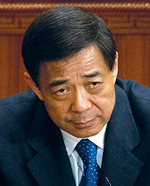
Bo Xilai
By Signe Predmore
Northwest Asian Weekly
Former Chinese government official Bo Xilai made recent international headlines with his fall from power and his alleged involvement in corruption. However, Cheng Li, a Brookings Institute senior fellow and Chinese political expert, has observed the scandal in a much different light.
“Chinese analysts have been too indulgent in recent Hollywood movie-like dramas in China, [obscuring] some of the most fundamental drivers of transformation in the country.”
Cheng is also the director of research at the John L. Thornton China Center in the Foreign Policy Program at Brookings and director of the National Committee on U.S.-China Relations. He spoke on June 20 at Seattle’s Town Hall where he provided insight into the Bo Xilai crisis and its implications for the current politics in China.
Bo Xilai was dismissed in March from his position as Communist Party chief of Chongqing following a controversy over the death of British businessman Neil Heywood. Chongqing’s police chief, Wang Lijun, sought refuge at the U.S. consulate after a disagreement with Bo over the investigation of Heywood’s death. Bo and Wang had worked closely together throughout Bo’s administration, but Wang was dismissed from his post a few days after a conversation in which he told Bo that his wife, Gu Kailai, would be considered a suspect in the Heywood case.

Cheng Li speaking at Town Hall on June 20 (Photo by Rebecca Ip/SCP)
Bo Xilai, part of the Communist Party’s “princeling” faction, which some consider to benefit from nepotism, was a politician notorious for his ruthless ambition. The incident underscored questions about the extent of corruption that he was involved with throughout his political career. Altogether, there are currently 11 cases involving Bo under investigation, Cheng Li told the audience on Wednesday. There are even allegations that he was connected to a plane crash that killed 112 people while he was mayor of Dailan.
In considering how to handle aspects of Bo Xilai’s case, Cheng said that the stakes are high and the challenge for the Chinese Communist Party (CCP) leadership is intimidating. Cheng gave the example of trial timing. The trial should not be rushed through too quickly in order to avoid giving the impression that the case is not being taken seriously. Yet, it may be desirable for the Communist Party to conclude the case before the 18th Party Congress and change in Party leadership, which will take place in October.
Probably the most sensitive question is that of the outcome. If murder allegations are proven, Bo and his wife could face the death penalty, and would be the highest-level politicians ever to do so. According to Cheng, the Bo Xilai incident has broad implications and comes at a time of imminent legitimacy crisis for the CCP, which has been the sole ruling political party of China since 1949. A self-professed joke-lover, Cheng found an apt metaphor for China in the story, in which an in-flight pilot addresses the cabin via loudspeaker.
“I have some good news and some bad news. The good news is that we are ahead of schedule. The bad news is that we are lost,” joked Chen.
He also pointed out the uncanny nickname of the incoming generation of leadership, the Lost Generation, a reference to their disrupted education during the Cultural Revolution.
“The crisis reveals the fundamental flaws of the Chinese political system. Official corruption has not only reached unprecedented scale and scope, but also, in my view, unparalleled in today’s world,” he said.
While China’s political weaknesses have been revealed through the Bo Xilai crisis, it also highlights various strengths. Cheng drew repeated attention to the function of the Chinese middle class as a stabilizing influence.
“One of the profound differences between the Tiananmen Square incident and the Bo Xilai crisis are that the Chinese economy and Chinese society are not disrupted now as before. Why? Because of the rise of the middle class, which never existed in 1989 in Tiananmen,” said Cheng.
He also credits the lack of public outcry to factors like the influence of special interest groups. Additionally, Cheng said the crisis has had a leveling influence on factional disputes.
Cheng sees the Bo Xilai crisis as a potential opportunity for the CCP to embrace needed reform on many levels.
One of the most important roles he highlighted for Chinese leadership in upcoming years is the promotion of the private sector and a cutback on state-owned enterprises.
The political crisis may temporarily relieve some of the usual deadlock between party factions and provide a window for implementing new economic policy.
“So I think it’s a good idea to invest in the Chinese stock market,” said Cheng half-jokingly.
In a widely circulated interview posted on the Brookings website, Cheng lists other changes he would like to see pushed forward, including legal reforms, an opening of the media, and a move towards a unique Chinese democracy.
Not all were convinced by Cheng’s portrayal of the significance of the Bo Xilai incident. Lin Le, a Master’s student in China Studies at UW Jackson School of International Studies, did agree with Cheng’s broader message about the necessity of economic reform and the probable development of a “Chinese-style” democracy, but did not see the Bo Xilai incident as a likely catalyst.
“The Bo Xilai crisis was just an exposed case of faction struggle within the CCP … He caught the public attention because of his high ranking,” said Lin. “Bo Xilai’s removal from his position [is] hardly earth-shaking.”
Whether Bo Xilai’s downfall will change politics in China remains to be seen, but as Cheng pointed out, “Weak leaders, weak government, and weak political parties are not unique to China. They are common challenges in today’s world, including European countries and the U.S.”
In conclusion, he provoked, “Should we say welcome, China, to partisan politics?” (end)
Signe Predmore can be reached at info@nwasianweekly.com.



